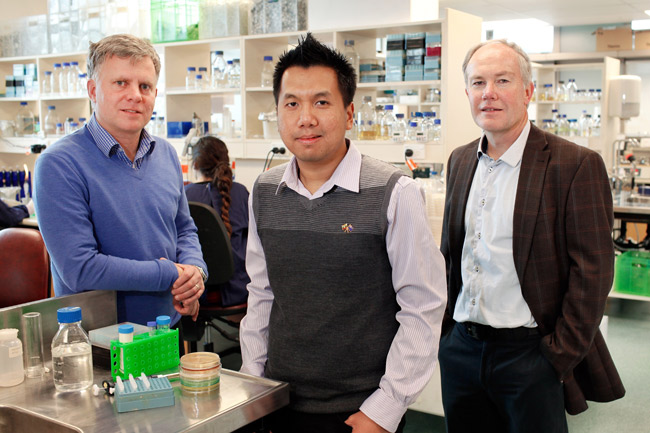
Dr Htin Aung (centre) and Otago TB research collaborators Professor Philip Hill of the Centre for International Health (left) and Microbiology and Immunology Professor Greg Cook, who is Dr Aung's mentor (right). Photo: Sharron Bennett.
Microbiology and Immunology researcher Dr Htin Lin Aung is one of the four latest Otago recipients of a prestigious Sir Charles Hercus Research Fellowship, and one of 17 Otago health researchers and students to gain a Health Research Council (HRC) Career Development award for 2018.
His project will receive $500,000 for a 48-month-long investigation into “Combatting tuberculosis at local and international frontlines”. Dr Aung will use next-generation sequencing technology as a “molecular weapon”, to understand the transmission of TB and Drug-resistant TB, which will lead to the development of rapid molecular diagnostic tools for reducing the emergence and spread of the latter disease.
For a summary of Dr Htin's project and a full list of Otago's recipients please visit here.
The Otago Bulletin Board recently got in touch with Dr Aung to congratulate him and ask him about his work.
What prompted you to enter into your research field?
Tuberculosis (TB) is a curable disease, and yet paradoxically it is the world's top infectious killer, claiming more than 1.5 million lives every year. Nelson Mandela once said that “we have known how to cure TB for more than 50 years. What we have lacked is the will and the resources to quickly diagnose people with TB and get them the treatment they need”. I am inspired by this. My research interests, therefore, strongly focus on translational aspects of tuberculosis research, working together with a multidisciplinary team that covers a broad spectrum of expertise from fundamental research to clinical laboratory and public health.How does it feel to be awarded a Sir Charles Hercus Research Fellowship?
I am humbled and honoured to receive this prestigious Fellowship.Are there any people/groups you'd like to acknowledge?
I would like to thank my longstanding mentor, Professor Gregory Cook, the Department of Microbiology and Immunology, the School of Biomedical Sciences, the University of Otago and the Maurice Wilkins Centre for their support. I also thank my national and international collaborators for their contribution. I am very grateful to the HRC for the funding that will allow me to conduct translational research that will contribute to combatting tuberculosis both at home and abroad.What are the most exciting next steps for your research now you have obtained the fellowship?
To expedite progress to combat TB, we need strong political commitment and multi-sectoral action. The most exciting next steps will be working together with key stakeholders to translate evidence resulting from this research into policy and practice.Anything else you'd like to add?
Tuberculosis is a global disease and being part of the global effort to tackle this disease demonstrates New Zealand is being a good global citizen.